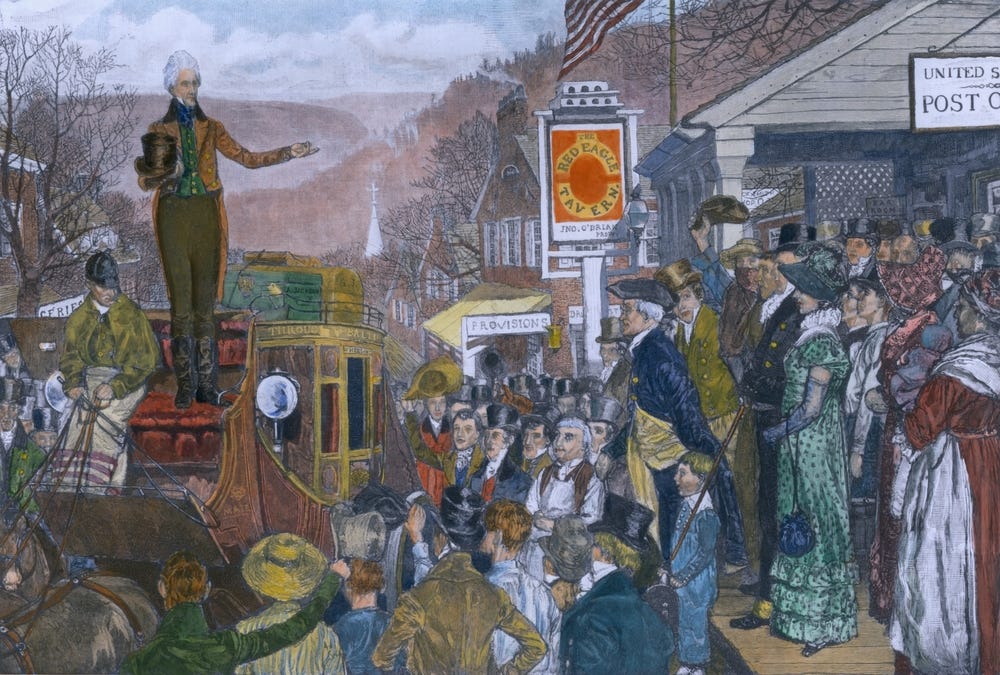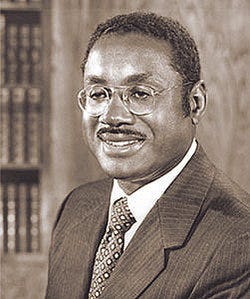E-Pluribus | March 11, 2022
The heckler's veto chalks up a win, looking to the past for America's role in the world, and why you should know the name Marcus Foster.
A round up of the latest and best writing and musings on the rise of illiberalism in the public discourse:
Richard L. Cravatts: Silencing Disfavored Speech
At Minding the Campus, Richard Cravatts takes another look at the UC Hastings College of Law shout-down of Ilya Shapiro at a recent appearance on campus. Although the school’s response after the event was commendable, it will take much more to shift the attitude that has been too often cultivated in today’s students that rejects free speech out of hand when it offends.
Where did the philosophical rationale come from that allows liberals and college administrators to make the leap from purporting to endorse freedom of expression for all on their campuses to instead reserving that right, in actual practice, only to favored groups?
For many on the Left who were students and young faculty members during the 1960s, it was the influence of the Marxist philosopher Herbert Marcuse and his notion of “repressive tolerance” that changed the way intellectuals understood who should, and should not, have the right to free speech—in short, whose views should prevail in the marketplace of ideas.
Marcuse realized that liberal progressivism could not achieve radical social and cultural change if its views had to compete on an equal plane with the conservative ideology of the Right. Why? Because in his view, the repressive force of the existing establishment could not be weakened unless its ability to control speech—and ideas—was diluted. That would only be accomplished, according to Marcuse, by favoring “partisan” speech to promote “progressive” or revolutionary change, which would, by necessity, be “intolerant towards the protagonists of the repressive status quo.” Someone like Shapiro, who articulates conservative views and questions the prevailing orthodoxy about race, equity, and inclusion, is thought to enjoy the privilege and power of whiteness. Therefore, Marcuse’s philosophy dictates not only that Shapiro’s speech should not be protected but also that it should be subject to suppression—specifically because it is harmful and racist, even “violent” in its insensitivity.
Administrators have been slow to respond to these outrageous outbursts and out-of-control protests by leftist students who have unilaterally decided that they have the moral right to suppress the speech of others whose views they marginalize, condemn, and abhor. But the frequency and intensity of these disruptions, and the virulence of the Left’s reaction to conservative speech, have finally pushed institutions to take a firm moral stand and address the problem head-on.
Read the whole thing.
Fred Bauer: Senator Cotton Lays Out a Vision of ‘Jacksonian Internationalism’
As the world continues to change and authoritarianism is on the move, it is worth considering what America’s role in preserving and expanding freedom should be. At National Review, Fred Bauer takes a look at Senator Tom Cotton’s recent speech at the Ronald Reagan Presidential Library where Cotton reached back almost 200 years to a less-than-revered president Andrew Jackson for at least part of the answer.
Though now out of fashion among many on the left, Andrew Jackson was for many years an emblem of the Democratic Party. He stood for folk populism at home and, as foreign-policy theorist Walter Russell Mead has famously argued, pugnacity abroad. Though skeptical of idealist foreign policy, Jacksonians were quite willing to use force to protect the national interest or national honor.
Cotton’s speech touched on many populist themes. He assailed the “administrative state” and large technology companies. He lamented various forms of left-leaning identity politics in public schools and demanded new efforts to crack down on crime. To combat illegal immigration, Cotton called for more enforcement at the border and mandatory E-Verify to check the legal status of workers; he argued for restricting family-based migration to spouses and minor children and for replacing the current chain-migration system with a skills-based one. He blasted the decision to allow the People’s Republic of China into the World Trade Organization as “one of the worst mistakes of this generation,” causing deindustrialization at home and threatening the international position of the United States.
Cotton situated these populist policies within a broader context of global politics. While he criticized “globalism,” his speech supported continued global engagement. In addition to slamming the Biden administration’s withdrawal from Afghanistan as reckless, he called for continued support for the Ukrainian resistance against Vladimir Putin’s invasion: “We will never accept a new Iron Curtain in Eastern Europe.”
Read it all here.
Robert Maranto & Craig Frisby: Marcus Foster: A Black Hero You’ve Never Heard Of
Each year, Black History Month tends to focus on a limited group of black Americans, usually the ones with whom many of us are already familiar. Writing at Real Clear Public Affairs, Robert Maranto & Craig Frisby introduce readers to Marcus Foster, a brilliant educator murdered by Marxist terrorists in 1973 for his unorthodox views and methods. Maranto and Frisby suggest Foster’s heterodox positions may also have something to do with why few Americans today have learned anything about him.
Anyone interested in black history and successful urban education should honor Marcus Foster.
Stressing old fashioned values like hard work, self-help, and academic achievement, Foster helped thousands of children as a public educator in Philadelphia. Foster was poised for even greater things as Superintendent of the Oakland Unified School District. But in 1973, he was cut down in a hail of cyanide-filled bullets, assassinated by the Symbionese Liberation Army, the Marxist terrorists better known for kidnapping newspaper heiress Patty Hearst.
Raised by a single mother in Philadelphia, the brilliant, hard-working Foster excelled academically while attending the historically black Cheyney University. Blessed with exemplary talent, Foster came to lead every college organization he joined. As John P. Spencer details in “In the Crossfire: Marcus Foster and the Troubled History of American School Reform,” Foster was influenced by legendary headmaster Leslie P. Hill, who stressed black achievement and “uplifting the race,” as exemplified by his slogan, “Harvard, Yale, Cheyney.” Foster was also religious, often ending his long days reading scripture.
Foster went on to lead three all black inner city Philadelphia public schools, improving safety, morale, attendance, and achievement at each by giving parents what they wanted. Contradicting countless professors, Foster wrote that “inner city folks…want people in there who get the job done, who get youngsters learning no matter what it takes. They won’t be interested in beautiful theories that explain why the task is impossible.”
Read it all.
In Case You Missed It
In this week’s Kowtow Chronicles, our digest of stories about those who capitulate to illiberal authorities (such as the Chinese Communist Party,) the head of the International Paralympic Committee grovels before Chairman Xi.
Around Twitter
“The price of free speech”? Yascha Mounk takes issue with Stanford University’s characterization/interpretation of the results of a study on vaccine misinformation:
Via Glenn Loury, the story of the (attempted) cancellation of Harvard University professor Roland Fryer:
Via Caleb Dalton and Casey Mattox, religious student groups are fighting for the right to have leaders who believe what the groups stand for:
And finally, a fed up Nate Silver on the trend we mentioned yesterday - conflating Vladimir Putin’s atrocities with all things “Russian”:











